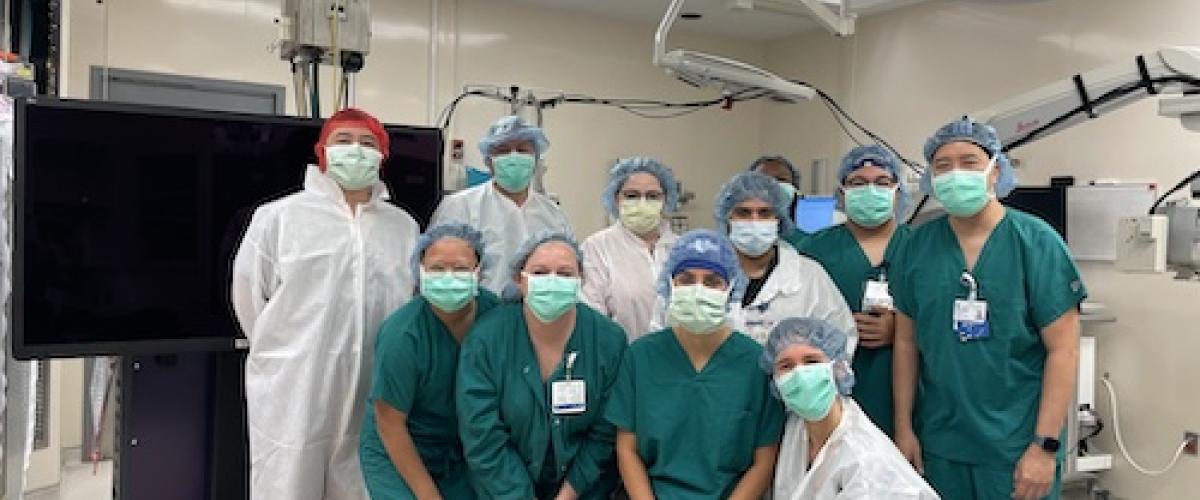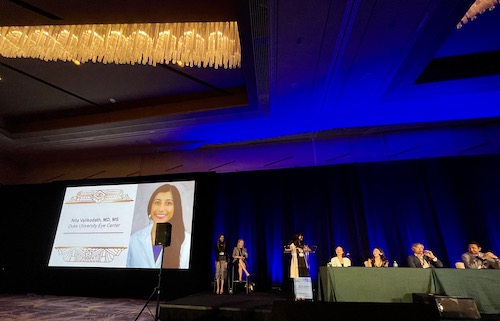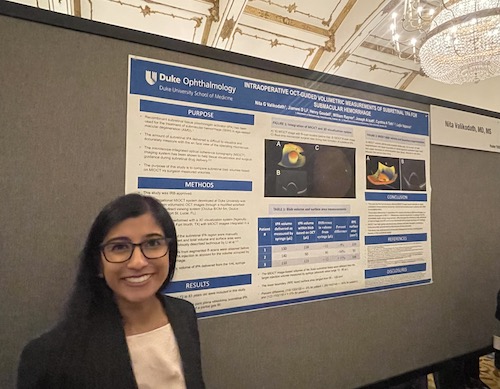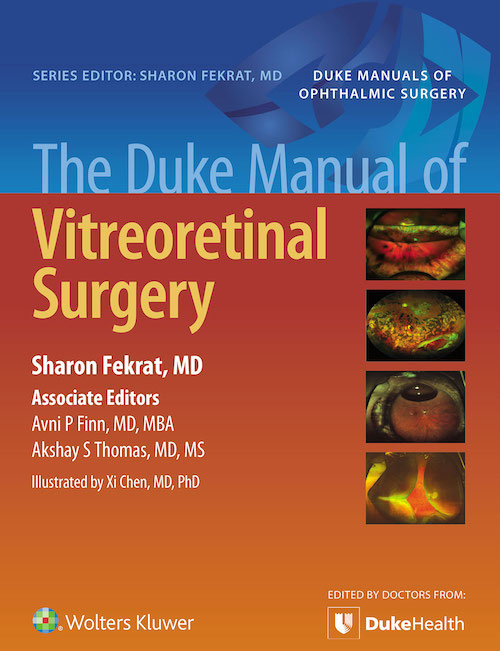
See one, do one, teach one! Vitreoretinal surgery fellows have many opportunities during the fellowship to teach and mentor others, including ophthalmology residents and Duke medical students. Fellows are encouraged to mentor residents and medical students in clinical research projects and manuscript writing.
There is a dedicated half to full day of vitreoretinal clinic each week at the Durham VA, staffed by the second year VR fellow with faculty consultation available. The second year fellows are the primary surgeon for all OR cases at the VA with faculty guidance present.
Throughout the entire fellowship, the fellows have the opportunity to teach ophthalmology residents in the operating room, clinic, inpatient rounds, and trauma attending at the Duke University Hospital and the Durham VA.
As part of a longstanding Duke tradition, VR Surgical Rounds are held weekly during the academic year on Wednesdays at 7 am. In these rounds, which are attended by the surgical retina faculty, retina fellows, retina research fellows, international observers, and the resident rotating on the vitreoretinal service, the surgical fellows present challenging vitreoretinal surgical cases including their own surgical videos. The retina faculty participates in and facilitates these collegial discussions, providing an array of perspectives on management.
Preoperative, intraoperative, and postoperative imaging is also discussed at VR Rounds. Duke-National University of Singapore retina fellows often join via video teleconference in addition to guest faculty from around the country. More networking!
Monthly journal clubs are held to discuss the latest literature and management controversies pertaining to our field.
Duke Advanced Vitreous Surgery (AVS) Course
The biannual Duke Advanced Vitreous Surgery (AVS) course was established by Robert Machemer, MD in 1980 as one of the first and most advanced courses in vitreoretinal surgery. The meeting attracts high profile speakers and opinion leaders from across the United States and around the world. Fellows have a chance to be involved in planning, preparation, and presenting at the meeting. They interact with all national and international speakers and get their way by showing their talents through the much anticipated “SKIT”.
Duke Fellows' Advanced Vitreous Surgery (fAVS) Course and Hands-On Wet Lab
In 2015, we launched a Fellows' AVS (fAVS) meeting that occurs annually. This is a dedicated conference for all first year US fellows and overlaps with main AVS every other year. The fAVS takes place in April when first year fellows have been exposed to enough clinical and surgical cases to appreciate the medical and surgical practice of retina and therefore benefit from the course. The forum includes hands-on wet lab, interactive panel discussions, fellows' surgical video competition, and one–on-one interaction with invited world-class faculty.
Advanced Pediatric Retina (APR) Course
Duke is recognized as a leading center in pediatric ophthalmology and retinal surgery. The biannual Advanced Pediatric Retina (APR) Course is designed for pediatric ophthalmologists and retinal specialists with interest in diseases such as retinopathy of prematurity (ROP), ROP-like retinal vascular diseases, persistent fetal vasculature, retinal dystrophies, pediatric trauma and other retinal diseases. The course alternates between Duke and University of Utah every other year. During the 2017 inaugural year, over 50 national and international faculty speakers participated in this informative, cutting-edge meeting. The course showcases utilization of advanced ophthalmic imaging to improve patient outcomes, pharmacologic treatment strategies and the cutting edge retinal surgery.
Lejla Vajzovic, MD and Cynthia Toth, MD are co-directors of this international course. Fellows participate as session moderators and on-site conference reporters for the ASRS.


Duke Vitreoretinal Surgical Rounds Unleashed: What would Machemer do?
The fellows participate as faculty at the Duke Vitreoretinal Rounds yearly at AAO, ASRS, and other vitreoretinal conferences.
A surgically focused manual for beginning vitreoretinal fellows. Published October 26, 2020, this publication was spearheaded by Duke VR Fellows, and supported by the VR surgical faculty. We are proud to make this available around the world for others to learn from our tips and tricks.

There are numerous lectures and seminars. Many of the departmental seminars are mandatory for Faculty, Residents and Fellows, while outside talks are open to all. Duke University Medical Center and the basic science departments of Duke University have many phenomenal guest lectures.
Regular lectures at Duke Eye Center include:
- Chairman’s Science of Disease Lecture
- Grand Rounds
- Visiting Professors Seminars
- Weekly Departmental Research Conferences
- Several endowed lectures
Each year, Duke Ophthalmology Residents' and Fellows' Trainee Day is an opportunity for formal presentation of the year’s research work, followed by a dinner event and celebration.
Monthly journal clubs are held to discuss the latest literature and management controversies pertaining to our field.
The Duke Eye Ball is a departmental social event that brings the faculty and trainees together in mid-winter.
Duke VR fellows have the opportunity to attend and present at quarterly NCRC meetings around the state. These meetings allow interaction between all retina MDs in the state of North Carolina, allowing Duke VR fellows to network with other local fellows and referring providers. These meetings foster interaction and knowledge transfer between academic retina and private practice retina. Interesting and challenging medical and surgical cases are discussed, in addition to topics related to the practice and business of retina in NC and nationally.
The DARSI lab, led by Cynthia Toth, MD includes a surgical wet-lab which is available throughout the fellowship for vitreoretinal surgery practice and research collaboration on the microscope-integrated OCT system. We also have a Microsurgery Advanced Technique Lab (MATLAB) that houses an EYESI virtual reality simulator with all of the vitrectomy modules.